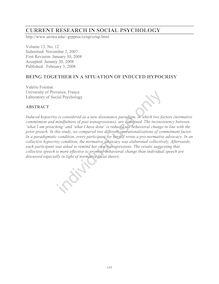Auteur
Valerie Fointiat
Œuvres

Documents
CURRENT RESEARCH IN SOCIAL PSYCHOLOGY http: www uiowa edu grpproc crisp crisp html Volume No Submitted: November First Revision: January Accepted: January Published: February BEING TOGETHER IN A SITUATION OF INDUCED HYPOCRISY Valérie Fointiat University of Provence France Laboratory of Social Psychology ABSTRACT Induced hypocrisy is considered as a new dissonance paradigm in which two factors normative commitment and mindfulness of past transgressions are combined The inconsistency between ‘what I am preaching' and ‘what I have done' is reduced via behavioral change in line with the prior preach In this study we compared two different operationalizations of commitment factor In a paradigmatic condition every participant for herself wrote a pro normative advocacy In an collective hypocrisy condition the normative advocacy was elaborated collectively Afterwards each participant was asked to remind her own transgressions The results suggesting that collective speech is more effective to promote behavioral change than individual speech are discussed especially in light of normative focus theory
Valerie Fointiat

Documents
Révisions
CURRENT RESEARCH IN SOCIAL PSYCHOLOGY http: www uiowa edu grpproc crisp crisp html Volume No Submitted: November First Revision: January Accepted: January Published: February BEING TOGETHER IN A SITUATION OF INDUCED HYPOCRISY Valérie Fointiat University of Provence France Laboratory of Social Psychology ABSTRACT Induced hypocrisy is considered as a new dissonance paradigm in which two factors normative commitment and mindfulness of past transgressions are combined The inconsistency between ‘what I am preaching' and ‘what I have done' is reduced via behavioral change in line with the prior preach In this study we compared two different operationalizations of commitment factor In a paradigmatic condition every participant for herself wrote a pro normative advocacy In an collective hypocrisy condition the normative advocacy was elaborated collectively Afterwards each participant was asked to remind her own transgressions The results suggesting that collective speech is more effective to promote behavioral change than individual speech are discussed especially in light of normative focus theory
Valerie Fointiat
9 pages
English